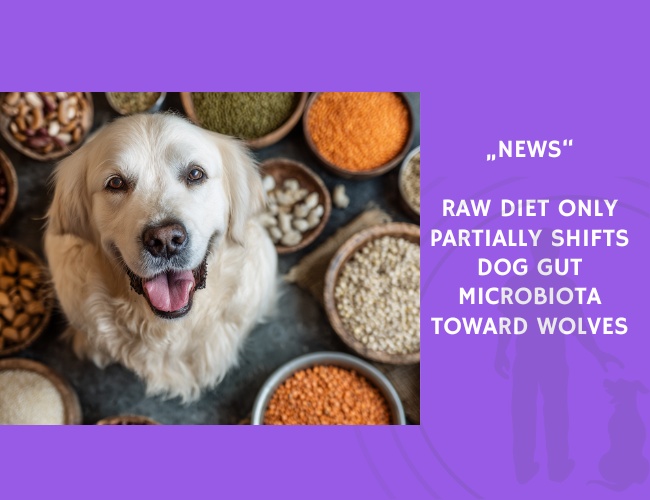Dogs have undergone significant dietary adaptations during domestication, particularly a shift toward starch digestion that differentiates their gut microbiota from that of wolves. In a study by Xu et al. (2021), researchers examined how the fecal microbiota of dogs responded to a switch from a kibble-based, starch-rich diet to a raw meat diet closely resembling that of wolves.
The study involved six American Staffordshire Terriers and six zoo-kept wolves. After three months on kibble, the dogs were transitioned to the wolves’ raw diet for 28 days. Fecal samples were collected throughout the transition (days 1, 7, 14, 21, and 28) and analyzed for microbial changes.
The results showed an initial increase in Fusobacteria and Bacteroidetes—microbes associated with protein fermentation—shortly after switching to the raw diet. These changes brought the dogs’ microbiota closer to that of wolves, particularly in the first three weeks. However, by day 28, the levels of these bacteria had reverted toward baseline, suggesting that the convergence was only temporary.
Moreover, the abundance of certain carbohydrate-fermenting bacteria like Faecalibacterium and Megamonas significantly dropped in raw-fed dogs and were already low in wolves. Yet, other wolf-specific microbial groups, such as unidentified Lachnospiraceae, remained distinct. This suggests that domestication has likely led to stable, co-evolved microbial communities that don’t fully revert with dietary change alone.
This study highlights the complex interactions between diet, gut microbiota, and evolutionary history. While diet clearly influences the microbial ecosystem of dogs, a complete return to their ancestral microbiome may not be possible due to the long-term effects of domestication on digestive physiology and microbiome coevolution.
Source: Jia Xu, A. A. M. J. Becker, Y. Luo, W. Zhang, B. Ge, C. Leng, G. Wang, L. S. Ding, J. Wang, X. Fu, G. Janssens. “The Fecal Microbiota of Dogs Switching to a Raw Diet Only Partially Converges to That of Wolves.” Frontiers in Microbiology, Volume 12, 2021-09-29. https://doi.org/10.3389/fmicb.2021.703084










